Ask the gaggle of gubernatorial wannabes what they'll do for Florida's environment
In the Sunshine State, the environment is the economy, but our governor has done a lousy job of protecting it. A special report from Craig Pittman of the Florida Phoenix.
By Craig Pittman
Hey Florida, congrats! We’ve just about made it through another hurricane season. But I should warn you that something even scarier is coming: A gubernatorial election.
Board up your windows! Batten down your lawn furniture! The politicians are coming, and they’re blowing Category 5 gusts of hot air!
In 2026, we’re going to elect our next governor, and candidates have been jumping into the race like kids leaping into a cool Florida spring on a scorching summer day. So far, there are three Republicans and two Democrats vying for the job.
The Republicans are Byron Donalds, a U.S. representative from Naples; Paul Renner, a former speaker of the House from the Jacksonville area; and James Fishback, a business executive with no government experience whom Politico described as a “fast-talking, Spanish-speaking Davie, Florida, native.” Little-known Lt. Gov. Jay Collins from Tampa is talking openly about it but has yet to formally enter the primary.
On the Democratic side, the competitors are former Pinellas County Republican U.S. Rep. David Jolly, now pursuing the Charlie Crist party-switch path; and Orange County Mayor Jerry Demings, a former police chief and sheriff.
As if those six weren’t enough, there’s an independent candidate, Miami Sen. Jason Pizzo, a former Democrat who’s announced he’s running, too.
Generally speaking, seeing seven candidates seeking the Governor’s Mansion could be a sign of how big a disaster the sitting occupant has been.
The Ron DeSantis administration is being investigated by a Leon County grand jury in the Hope Florida scandal. He’s under scrutiny for voting to give $83 million to a campaign contributor in exchange for 4 acres of Destin land nobody wanted. His proposal to build golf courses in a state park last year was so deeply unpopular that the Legislature passed a law this year to prevent him or his successors from ever trying to do it again.
Note that two of the three episodes involve DeSantis’ horrible handling of environmental issues. That’s why, I think, every chance we get in the next 12 months, we voters ought to quiz his would-be replacements about where they stand on that segment of the state’s responsibilities.
As we have seen repeatedly, the environment in Florida IS the economy. The two are as inextricably intertwined as the tangled roots of a mangrove forest.
Dirty water
When DeSantis was first elected in 2018, Florida voters were concerned about toxic algae blooms that had lasted for months. DeSantis swore he’d cure this by appointing a panel of scientists to tell him about what to do.
He appointed the panel — but then he and the Legislature failed to follow most of its recommendations.
Now Florida is the No. 1 state for polluted lakes. A toxic algae bloom killed off so much seagrass in the Indian River Lagoon that more than 1,000 manatees starved to death. Florida’s longest river, the St. Johns, is coping with steadily increasing pollution from septic waste.
Even when the Legislature passed a law ordering special protections for our iconic springs, the agencies answering to DeSantis ignored it, noted Grant Gelhardt of the Sierra Club.
Instead of attacking pollution sources, DeSantis cut a deal to pay millions of dollars to an Israeli company that dumps a hydrogen peroxide mix into algae-tainted waterways. But then the algae comes back and the Israelis have to do it over. Even the head of the Israeli company thinks this is futile.
“DeSantis’ fight against algal blooms in Florida will fail,” he wrote on X, back when it was just plain Twitter. “There is no question that preventing raw sewage and runoffs from spilling into waterways must be addressed.”
So, the first question everyone should ask the gubernatorial candidates is: What will you do to fix Florida’s rampant water pollution problems?
Lake O woes
I had a lengthy chat about this with Gil Smart of the Vote Water organization, who pointed out that Lake Okeechobee in particular needs help.
It was recently named the dirtiest lake in the U.S. Things have gotten so bad there that Bass Masters removed Lake O from its Top Ten Bass Lakes in the United States.
Rather than clamp down on polluters poisoning Lake O and other waterways, the Florida Department of Environmental Protection has set up a series of voluntary “basin management action plans” that all fail, Smart said.
“That’s the state’s main tool for reducing pollution and it’s not working,” he said. “At what point do we stop saying, ‘Oh, that’s a shame,’ and start doing something about it?”
The polluters tend to be big campaign contributors, which guarantees they’re left alone. But the pollution is taking an economic toll on our tourism, fishing, and other industries, so whoever takes over from DeSantis will need to make some hard choices.
Last year, Donalds convened a water summit that matched polluters with regulators — and refused to allow in either the press or the public. If he opened the meeting to everyone, Donalds argued, the poor polluters and the people regulating them would be too scared to talk honestly.
To me, “honest talk” between polluters and regulators is less important than letting the public — the people paying the tax bills and drinking the water —- know what’s going on.
But that leads to our second question for the candidates.
On the downlow
DeSantis clearly missed his calling. Instead of politics, he should’ve gone into espionage.
He persuaded the Legislature to make his travel records a state secret, even though no governor ever sought such a Sunshine Law exemption. He held a Cabinet meeting in a foreign country, ensuring most Floridians couldn’t participate. Even worse, he’s repeatedly cut non-public deals to give away public land to private interests.
First came his attempt to allow a company to build three golf courses in Jonathan Dickinson State Park, plus hotels and pickleball courts in other parks. That blew up in his face like a hand grenade.
Then he attempted to swap land from the Withlacoochee State Forest with a Canadian golf course builder. An uproar ensued and the land went unswapped.
More recently, he wanted to give some mystery developer 600 acres from the Guana River Wildlife Management Area. Once the public found out, the developer melted back into the shadows.
Each instance of DeSantis trying to keep things on the downlow led to widespread outrage. People love Florida’s preserves, and they don’t like seeing some ploy to give them away.
That’s why I think the next question for the candidates has to be: Will you treat public land like it’s owned by the public, and not as your personal property to benefit friends?
We want to return to the days when our precious state parks, preserves,, and forests stayed public and stayed natural.
This leads to the one area where DeSantis almost came across as a good guy.
Undermining the Everglades
For 25 years, when Florida politicians wanted to fool the voters into thinking they liked the environment, they talked about restoring the Everglades.
“I pledge to spend millions on restoration of the River of Grass,” they’d promise solemnly. What they really meant was, “I’ll hand over millions in tax dollars to well-connected contractors to build what the plans call for, but I won’t do it fast and they’ll take their time, too.”
That’s why the Everglades restoration has gone billions over budget and years beyond its original deadline.
But not even the most cynical would have built a new pollution source like an immigrant detention camp in the Big Cypress National Preserve. That would undercut all the restoration work that’s already been done.
Yet DeSantis did it, and without even checking its environmental impact.
Environmental groups accused him of betraying the Glades. But DeSantis scoffed at being considered an Everglades villain, considering all the money he’d steered toward the River of Grass.
“You’re talking about the guy who’s plowed how much money into Everglades restoration?” DeSantis said.
That’s sort of like him saying, “I’ve spent a lot of money on a fancy car, so you should respect my automotive expertise — even though I’ve just dumped a bag of sugar in the gas tank.”
Lawsuits are working their way through federal court to shut this camp down.
I contacted one of the plaintiffs: Eve Samples, executive director of Friends of the Everglades, the organization co-founded by Marjory Stoneman Douglas. I asked her what she would ask the candidates to replace DeSantis. Her answer:
“Will you commit to banning all harmful development from the Everglades that undermines the billion-dollar restoration project?”
That should cover not only the prison camp known as “Alligator Alcatraz,” she said, but also a rock mine being pushed by Big Sugar and various residential and commercial developments that have been steadily chomping away at the margins.
“You can’t be an Everglades governor and allow development in the Everglades,” she said.
Which leads to the next question.
Developer-Santis
DeSantis has never met a developer he didn’t like. He’s signed every bill they supported. He’s backed controversial developments so often, I started calling him “Developer-Santis.”
Did the developers want expensive toll roads to spread urban sprawl throughout rural areas? Despite widespread objections, DeSantis said yes to that.
Even when a project would make hurricane evacuation much worse, he didn’t support saving the lives of Floridians. Instead, he voted to say yes to the developer.
And if any local government failed to kowtow to developers, he’s been eager to force them into compliance.’
The result of putting the developers in the driver’s seat is that growth is careening out of control, leaving our sewer systems overloaded, our water systems running dry and our roads crowded and crumbling.
Lots of Floridians are becoming fed up with this unwavering governmental support of sprawl-over-all. They want a change. That’s especially true in our remaining rural areas, where people like living at a slower pace.
So, the next question I would ask the candidates is: Will you stand up to developers and tell them no? Will you stick up for saving some parts of Florida as rural? Will you commit to keeping these slices of paradise the way they are?
If they do it even once, that’s better than DeSantis.
Last but not least, let’s talk about science.
The anti-scientist
While I was talking to Gelhardt of the Sierra Club, he told me, “Science should be in the forefront of any plan to protect Florida’s resources.” Who could argue with that?
Our governor would. In the future, DeSantis will be remembered as the most virulently anti-science governor ever.
During the pandemic, he became such a contrarian to the medical establishment that he actually scolded teenagers for wearing masks .
He’s also appointed people who were anti-science, like an anti-vaxxer surgeon general. And consider his wildlife commissioners, who are so eager to shoot bears that they ignored that the science shows the bear population has declined.
He was cool with signing a new law based on the thoroughly debunked conspiracy theory about “chemtrails.” Meanwhile, even though signs of climate change are obvious everywhere in Florida, he approved legislation to remove that term from most of state law. He had the full support of Speaker Renner on that one, by the way.
Surprisingly, ignoring climate change does not make it go away. We will continue facing soaring temperatures and rising sea levels that affect everything from the intensity of hurricanes to the frequency of expensive beach renourishment.
So, I think it’s fair to ask the candidates if they believe in following what science says about solutions. Or would they prefer Florida continue relying on folk tales, internet rumors, and ancient superstitions?
I think we need to pin these guys down now. Otherwise, they’re liable to try to top DeSantis. Look for them to start building a fire circle in front of the Capitol, dancing around and chanting gibberish to placate the angry hurricane gods.
A note to readers
Thank you for reading today’s report. One of the missions of Tropic Press, in addition to providing original news coverage and commentary, is to lift up the work of other journalists to our statewide audience. We hope you enjoyed this article. In 30 years at the Tampa Bay Times, Craig Pittman won numerous state and national awards for his environmental reporting. He is the author of six books. In 2020 the Florida Heritage Book Festival named him a Florida Literary Legend. Craig is co-host of the “Welcome to Florida” podcast. Florida Phoenix is part of States Newsroom, the nation’s largest state-focused nonprofit news organization. You can get a free subscription to Florida Phoenix here:
In case you missed it …
Miss Mingo has the answers to all your pressing questions: In yesterday’s edition, she addressed: Will my BENGAY be confiscated if I travel through the Free State of Florida because, you know, it’s woke? And how is it we can afford ICE agents but not air traffic controllers? Check out her answers—and catch up with with her previous columns— here:
More online
Thank you for reading the Tropic Press newsletter. You also have access to the Tropic Press website for additional and previous posts, an archive of posts from our advice columnist, Miss Mingo, occasional guest commentaries, and information about The Strange Files series of mysterious adventures and other books.
J.C. Bruce, journalist and author, is the founder of Tropic Press. He holds dual citizenship in the United States of America and his native Florida. Forward this email to your friends. They will love you for it.
Thanks to our sponsor
Today’s report is brought to you by The Light Fantastic 2: Amazing Pets, an anthology of hilarious science fiction short stories and novellas created by a hive of award-winning Florida writers. Now on sale. Get your copy here.
It’s good to share
Tropic Press is a reader-supported publication. Here’s a big shout-out to all our loyal subscribers. Feel free to forward this email to your friends so they can enjoy it too. The more people we reach, the greater community of like-minded people we build. This is your chance to be part of all that. Thank you.


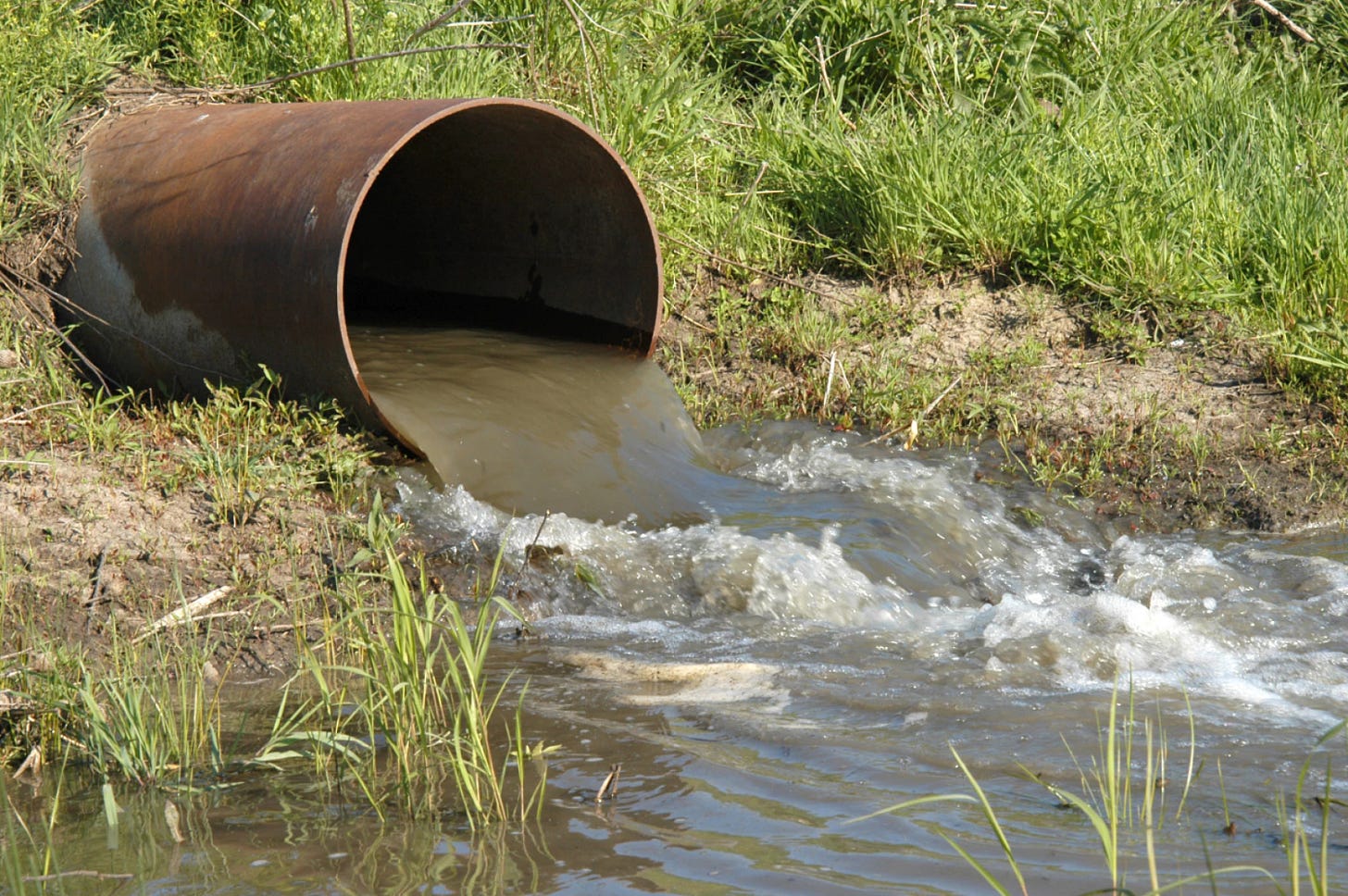


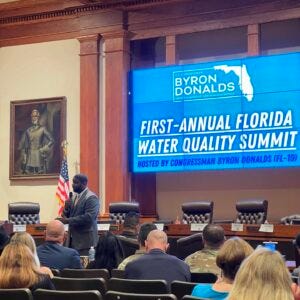

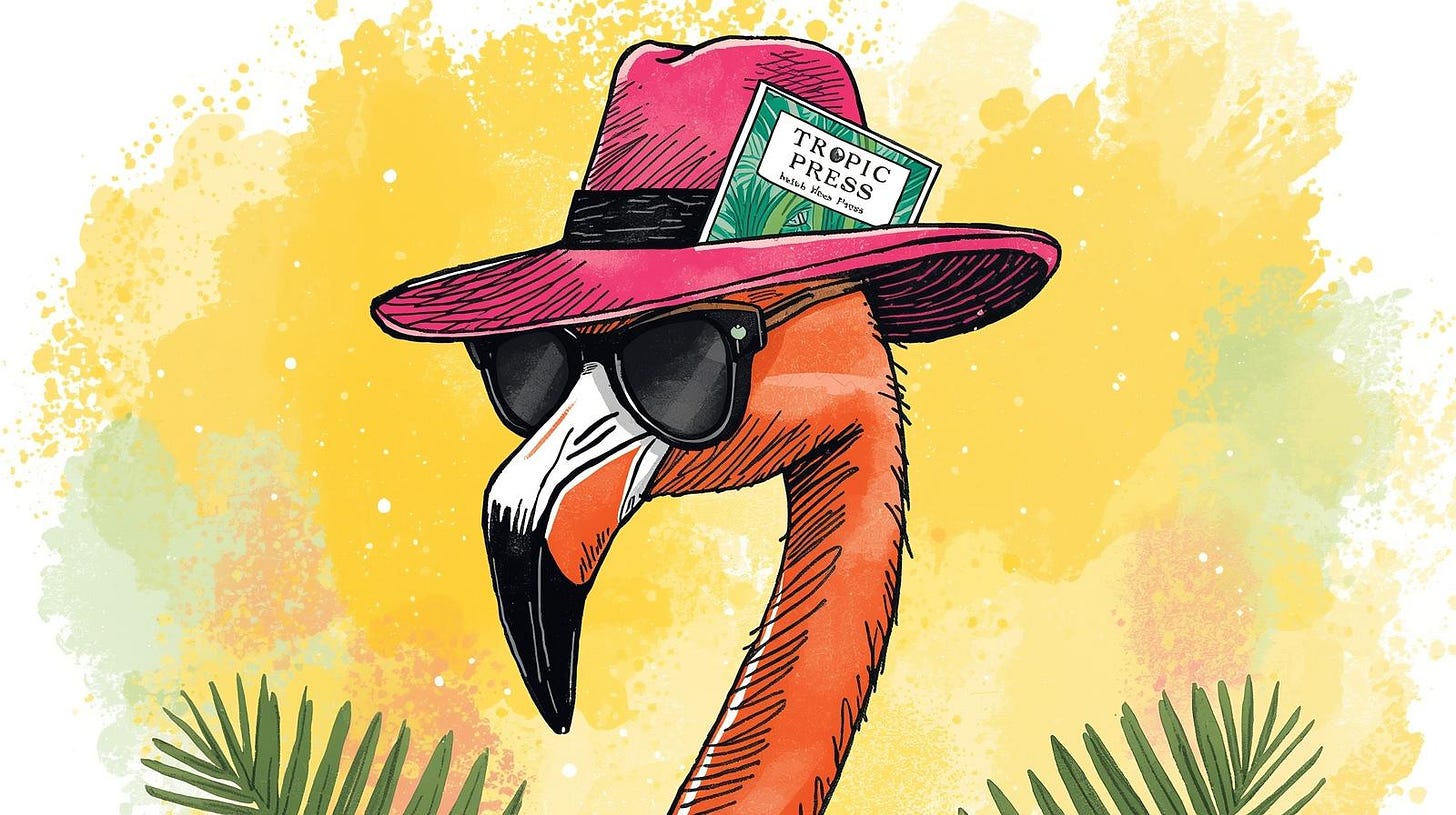
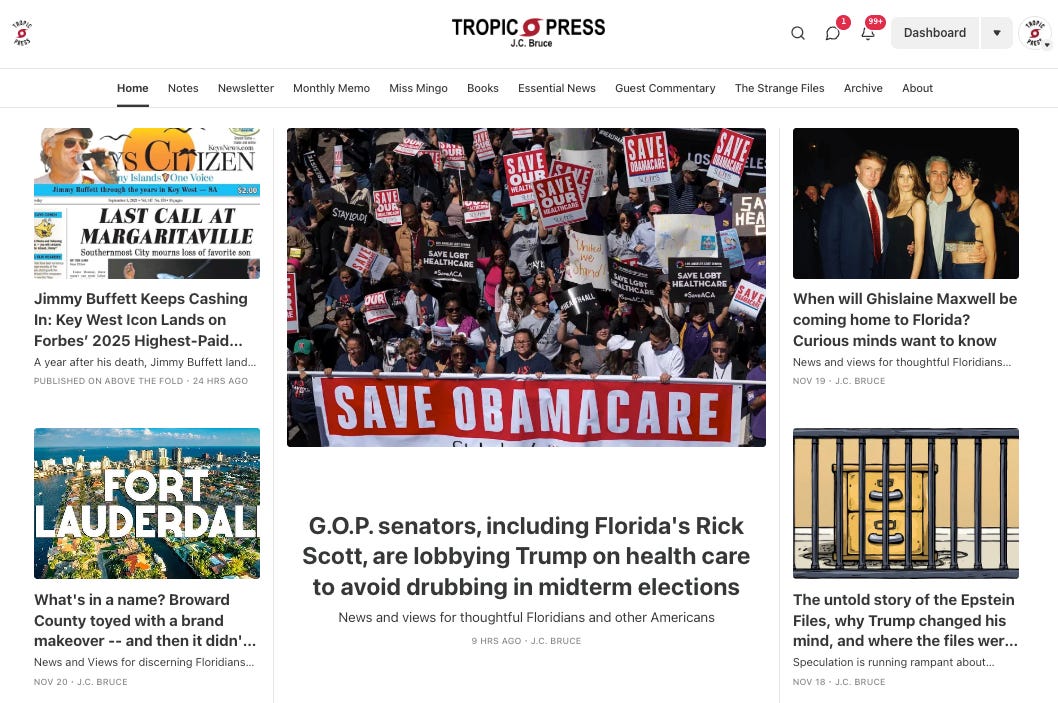
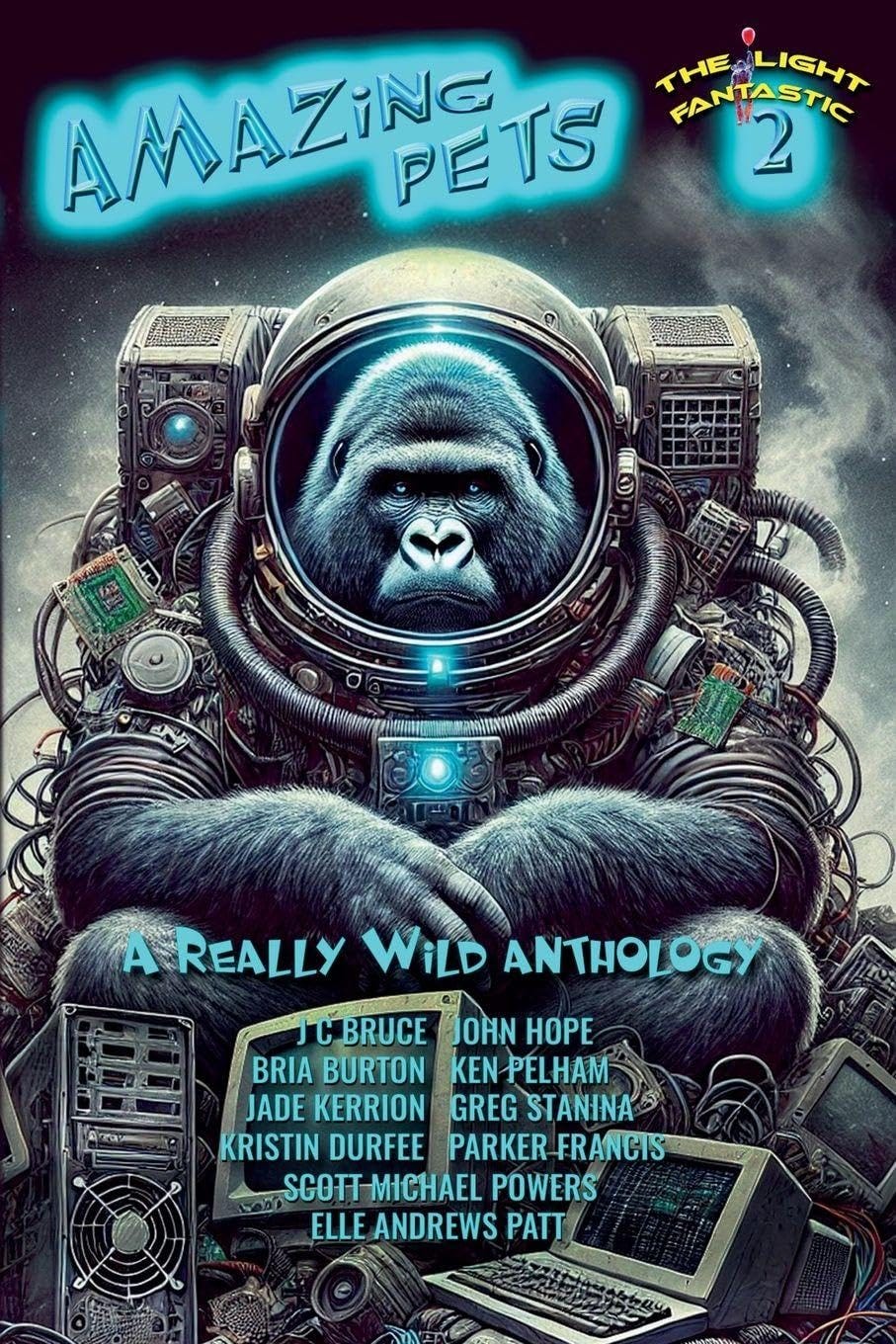
I would ask that they promise to never,ever let the hell forsaken word"WOKE"pass their lips,and that it will never be used to hide bad policy behind.
I think also DeSatan should be sent back to Hell from where he came,along with all his anti woke bullshit.
I'll save you the trouble of asking the candidates environmental questions. Just vote for the Democratic candidate. They may turn out far from perfect but there is no question they will be much better than any Republican. As we've seen with Death-santis and Prick Scott, the R's will all speak with forked tongue. They'll greenwash til the cows come home. Just look at the env. records of those running. They all have a record which one can assume defines them pretty well...and it ain't a good record for any of the R's.